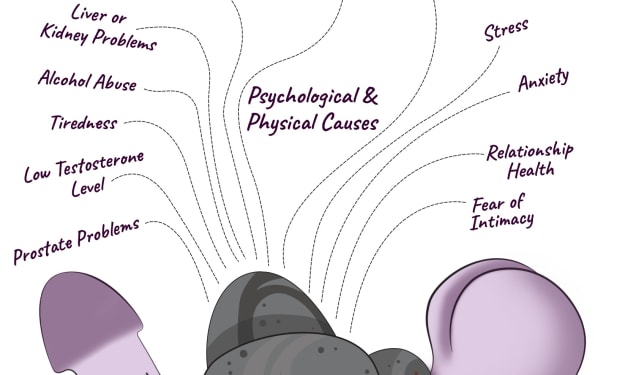Symptoms of Erectile-Dysfunction
Erectile Dysfunction Symptoms

Introduction:
Erectile dysfunction (ED) is a condition that can have a significant impact on a man's sexual health and overall well-being. It is important to recognize the symptoms of ED in order to seek appropriate medical help. In this blog post, we will discuss the causes of erectile dysfunction, explore the symptoms associated with it, delve into low sexual desire as a symptom, and provide information on how to treat this condition effectively.
Causes of Erectile Dysfunction:
Erectile dysfunction can stem from various factors, both physical and psychological. Common causes include:
Medical Conditions: Chronic diseases such as diabetes, heart disease, high blood pressure, and obesity can contribute to ED by affecting blood flow and damaging nerves.
Hormonal Imbalances: Low testosterone levels or abnormal thyroid function can impact sexual function and contribute to erectile dysfunction.
Medications and Substance Abuse: Certain medications, including antidepressants and blood pressure drugs, can cause ED. Excessive alcohol consumption, smoking, and illicit drug use can also contribute to the problem.
Psychological Factors: Stress, anxiety, depression, relationship conflicts, and performance anxiety can all contribute to erectile dysfunction.
Symptoms of Erectile Dysfunction:
The primary symptom of erectile dysfunction is the inability to achieve or maintain an erection firm enough for sexual intercourse. Other symptoms may include:
Reduced Sexual Desire: Men with erectile dysfunction may experience a decrease in sexual desire or a lack of interest in sexual activities.
Difficulty Initiating or Sustaining Erections: It may become increasingly challenging to achieve an erection, or the ability to maintain an erection throughout sexual activity may be compromised.
Decreased Sexual Satisfaction: Erectile dysfunction can lead to feelings of frustration, embarrassment, and dissatisfaction with sexual encounters.
Low Sexual Desire as a Symptom:
Low sexual desire can be a symptom of erectile dysfunction, although it is important to note that the two are separate issues. Low sexual desire refers to a lack of interest or motivation for sexual activities. It can be caused by physical factors such as hormonal imbalances, certain medications, or chronic illnesses. Psychological factors like stress, anxiety, depression, or relationship problems can also contribute to low sexual desire.
Causes of Low Sexual Desire:
Low sexual desire can stem from a variety of factors, including:
Hormonal Imbalances: Low testosterone levels or imbalances in other hormones can affect sexual desire.
Medical Conditions: Chronic illnesses, such as diabetes, cardiovascular disease, and neurological disorders, can impact sexual desire.
Medications: Certain medications, including some antidepressants and blood pressure medications, may decrease sexual desire as a side effect.
Psychological Factors: Stress, anxiety, depression, and relationship conflicts can contribute to a decrease in sexual desire.
Treating Erectile Dysfunction:
Treating erectile dysfunction involves addressing the underlying causes. Here are some common treatment options:
Medications: Oral medications like PDE5 inhibitors (e.g., Viagra, Cialis) can improve blood flow to the penis and facilitate erections.
Hormone Replacement Therapy: If hormonal imbalances contribute to ED, hormone replacement therapy may be recommended.
Psychological Counseling: Therapy, including cognitive-behavioral therapy (CBT) or psychosexual counseling, can help address psychological factors associated with erectile dysfunction.
Lifestyle Changes: Adopting a healthy lifestyle, including regular exercise, a balanced diet, stress management, and quitting smoking or reducing alcohol consumption, can improve erectile function.
Vacuum Erection Devices: These non-invasive devices create a vacuum around the penis, drawing blood into the area and facilitating an erection.
Penile Implants: Surgical insertion of penile implants can provide a long-term solution for severe cases of ED.
Ask the Sexpert:
If you have concerns or questions about erectile dysfunction or low sexual desire, book an appointment with our experts at Dr. Arora Clinic. Our specialized team can provide personalized guidance and treatment options to address your specific needs.
Frequently Asked Questions:
Can low sexual desire be a symptom of erectile dysfunction?
Yes, low sexual desire can be a symptom of erectile dysfunction. Both conditions can have physical and psychological causes and may coexist in some individuals.
Can erectile dysfunction lead to hair loss?
There is no direct link between erectile dysfunction and hair loss. These conditions are typically unrelated and have different underlying causes.
Can erectile dysfunction symptoms last forever?
Erectile dysfunction symptoms can be temporary or chronic, depending on the underlying cause and the effectiveness of the chosen treatment. Seeking medical help can provide guidance on managing and potentially resolving the symptoms.
Can erectile dysfunction be painful?
Erectile dysfunction itself is not painful. However, it can cause emotional distress, frustration, and dissatisfaction with sexual experiences, which may lead to feelings of discomfort or distress.
Is erectile dysfunction a blood flow problem?
Yes, erectile dysfunction can be caused by insufficient blood flow to the penis. Conditions such as atherosclerosis (narrowing of blood vessels) or damage to blood vessels can impede blood flow and contribute to ED.
What blood test shows erectile dysfunction?
Blood tests can be conducted to measure hormone levels, including testosterone, which can contribute to erectile dysfunction. Other blood tests may be performed to assess overall health and identify underlying conditions that could be causing ED.
What is the biggest reason for erectile dysfunction?
The biggest reason for erectile dysfunction varies among individuals. It can be a combination of physical and psychological factors, including chronic illnesses, hormonal imbalances, medication side effects, stress, anxiety, and relationship problems. Consulting a healthcare professional can help determine the specific underlying causes.
How do you confirm you have erectile dysfunction?
If you suspect you have erectile dysfunction, it is recommended to consult with a healthcare professional. They will review your medical history, conduct a physical examination, and may order additional tests to confirm the diagnosis and identify potential underlying causes.
Conclusion:
Recognizing the symptoms of erectile dysfunction is the first step toward seeking appropriate help and treatment. Understanding the causes, including physical and psychological factors, can assist in finding effective solutions. If you are experiencing symptoms of erectile dysfunction or low sexual desire, do not hesitate to reach out to healthcare professionals who can provide expert guidance and support.
Book an appointment with our specialists at Dr. Arora Clinic to discuss your concerns and explore personalized erectile dysfunction treatment.
About the Creator
Pawan Kumar
Pawan help peoples suffering from erectile dysfunction and provide information about permanent treatment for erectile dysfunction from expert sexology doctors. For Information Visit: https://www.draroras.com/erectile-dysfunction-treatment






Comments
There are no comments for this story
Be the first to respond and start the conversation.